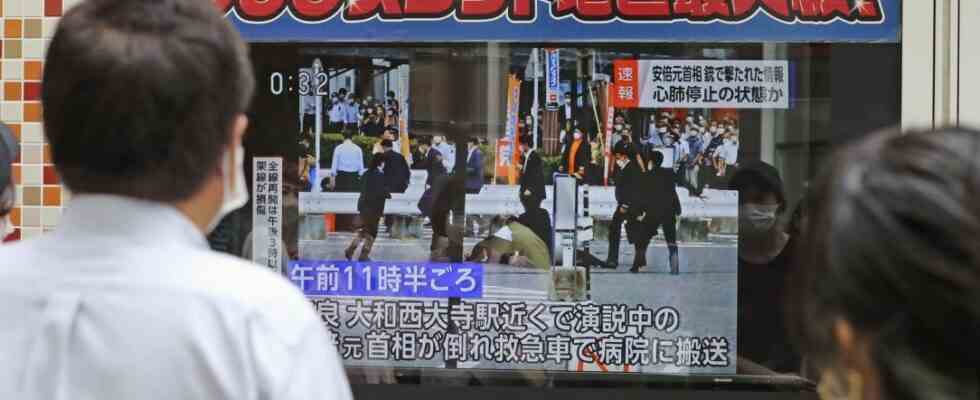A politician’s murder is always political, whether the assassin acted out of confusion or with manipulative intent. The death of Shinzo Abe will also leave deep scars in Japanese politics. Abe was the longest-serving prime minister in Japan’s post-war history. To the very end, he was the defining figure of the all-powerful LDP, a man of towering importance for the country’s positioning in what is probably the most important crisis region of the next decade – the Pacific. Anyone who murders this person shakes politics to the core – whether intentional or not.
Abe was shot dead by 41-year-old Tetsuya Yamagami on Friday in Nara, capital of the eponymous prefecture in the south of the main island of Honshu, during a campaign appearance. At least one of two volleys from an apparently homemade weapon hit the 67-year-old politician, who was taken to the hospital with no signs of life. Attempts at resuscitation were unsuccessful.
A wave of dismay and innumerable expressions of condolence flooded the communication channels immediately after the news of his death. Abe was not only possibly the most important and influential politician in modern Japan, he was a polarizing and electrifying figure. His goals ranged from ambitious to revolutionary, his influence on the conservative orientation of Japanese society, his unorthodox economic policy and above all his pressure for a restructuring of the Japanese security architecture made him the strongest symbol of a self-confident but also nationalistic Japan. No wonder that he also became a stimulus figure.
Worldwide horror
The world reacted in horror to the murder. Abe was his country’s representative on the global stage for ten years – his political contemporaries, all of whom were made aware of the dangers they face in their jobs, were correspondingly shocked. Murders or attempted murders of politicians are a recurring phenomenon worldwide. In democratic countries, where being assassinated by a political opponent is not an occupational hazard, the perpetrators are often confused, mentally disturbed or act out of terrorist or extremist motives. What counts is always the act of a symbolic figure who is well known for his job, but who also seems unapproachable. It is not uncommon for the perpetrator to hope for fame, attention or relief from their own trauma.
For example, John Hickley shot US President Ronald Reagan because he wanted to attract the attention of actress Jodie Forster, whom he admired. Dieter Kaufmann, who shot the then Interior Minister Wolfgang Schäuble in 1990, lived in a delusional world. Spectacular attacks such as the assassination of US President John F. Kennedy or Swedish Prime Minister Olof Palme also had a political impact because conspiracies could develop over the years about the motive and the perpetrator.
After Abe’s death, an old debate will be revived: How peaceful is the non-aggressive and enormously considerate Japanese society really? In Japan, practically no one can own a gun privately, and the murder rate is among the top ten in a global comparison. Serious violence is not present in the public consciousness. In 2017, there were three deaths from gun violence across the country. The most well-known politically motivated murder dates back to 1960, when the leader of the Socialist Party was killed with a samurai sword by a far-right fanatic.
Pacifism as a hot topic
Abe stood for fundamentally changing Japan’s defensive role in security policy and leading the country from the pacifism decreed after World War II to a security policy normality. This included his goal in life, to remove the so-called pacifism clause from the constitution and to enable Japan to pursue a normal policy of deterrence. Because Abe always satisfied nationalistic needs and maintained the connection to the militaristic past through demonstrative visits to the Yasukuni Shrine with its undifferentiated worship of heroes, mistrust and criticism also grew.
In China, nationalists immediately posted happy messages in digital channels after the attack and called the assassin a hero. Like no other, Abe had criticized China’s aggressive foreign policy and – after his term in office – spoke out in favor of recognizing Taiwan. According to initial findings, the perpetrator was apparently not driven by all these motives. However, that is of secondary importance when it comes to murdering politicians. The deed is symbolic enough – the public decides what for.

